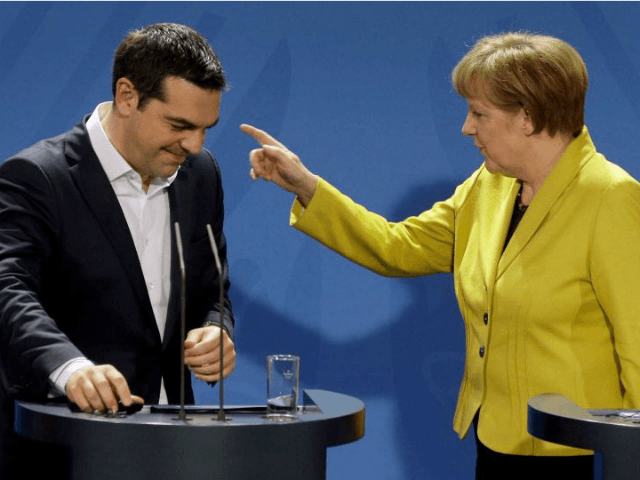Leftist Greek Prime Minister Alexis Tsipras, during a visit with German Chancellor Angela Merkel in Berlin, raised the issue of Greece receiving war reparations for the damage the Nazis did to the country in World War II. Despite Merkel’s rapid dismissal of the possibility, the two appeared cordial and friendly during their public press event leading up to a reception dinner.
“It’s not a material matter, it’s a moral issue,” Tsipras told the press in a question-and-answer session with Merkel in Berlin, possibly the first time a foreign head of state demanded reparations for the crimes of Nazi Germany in the heart of Berlin. Merkel stated simply, “In the view of the German government, the issue of reparations is politically and legally closed.”
German officials have said in the past that there is “zero” chance that Germany would give Greece money to atone for WWII-era crimes, though Greek politicians, including Tsipras, have insisted on demanding them. Earlier this month, Greek Justice Minister Alexis Paraskevopoulos threatened that Greece could “seize” property from German corporations to make up the debt arguably owed by Nazi Germany. Nor is that demand unique to radical leftist Syriza Party politicians: in 2013, the center-right government of Prime Minister Antonis Samaras drafted a report arguing that Germany indisputably owed Greece reparations.
Despite the tensions surrounding the decades-old issue, the press conference and subsequent public appearances seemed to go smoothly. Tsipras clarified later in the press conference that “today’s Germany has nothing in common with the Third Reich” and that he had no intentions of “seizing” property from German corporations. Merkel, on her end, noted multiple times that Germany does not unilaterally decide on Eurozone issues: “Germany isn’t the institution that decides whether or not the program is being carried out properly.”
The dinner later in the evening in honor of Tsipras’ visit appeared also to contain gridlocked dialogue on how to solve Greece’s debt crisis, according to sources invited to the event. Greek newspaper Ta Nea reports that the events main dishes were “reforms and duck,” and that government sources overheard Greek leaders “rais[ing] ‘red lines’ for settings that cannot be accepted within the country, which–according to reports, were accepted politically by the German leadership.” That acceptance, of course, is contingent upon the opinions of other eurozone countries.
While the meeting appears not to have resulted in any concrete changes in talks between Greece and the eurozone, having Tsipras and Merkel stand beside each other and speak to the public appears to have had a soothing effect on public opinion in each nation towards the other. Reuters notes that German crowds used the event to express support for the Greek people:
But outside the Chancellery in Berlin, where he and Merkel reviewed an honor guard, the Greek prime minister encountered a friendly crowd trying to put a positive face on bilateral ties. They waved banners with pink hearts proclaiming “German loves Greece” and vice-versa and a Greco-German couple kissed.

COMMENTS
Please let us know if you're having issues with commenting.